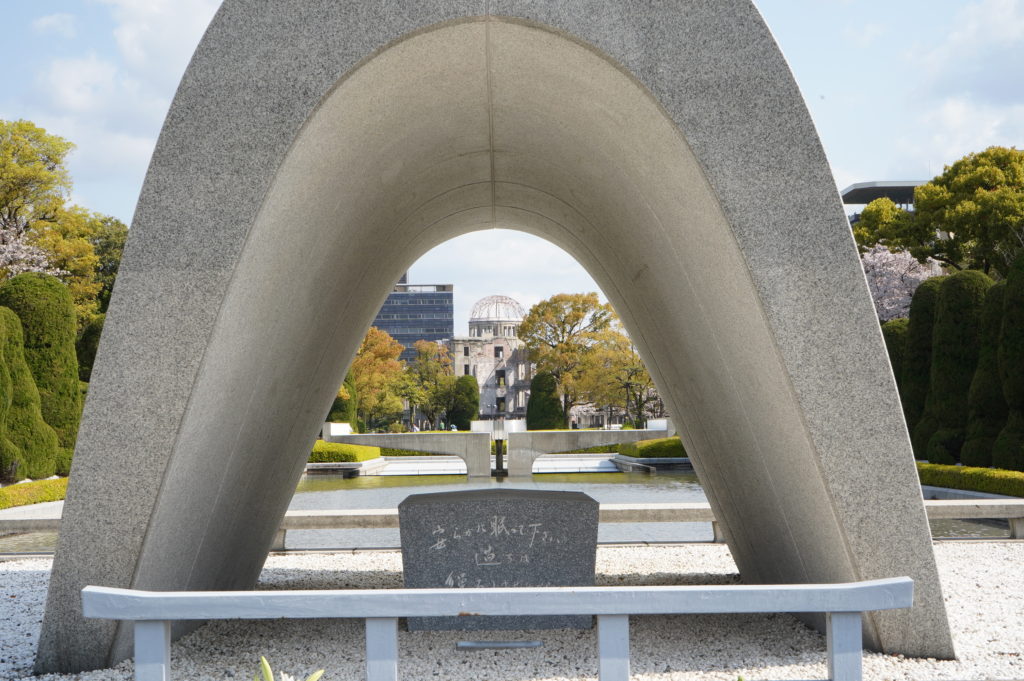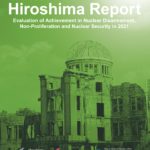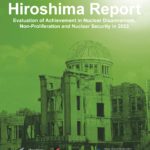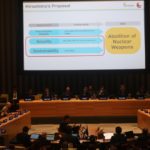TPNWWhat is the Treaty on Prohibition of Nuclear Weapons (TPNW) ?
On November 25, Antigua and Barbuda ratified the Treaty on Prohibition of Nuclear Weapons (TPNW). The treaty enters into force after 50 states have ratified or acceded to it. The status of the TPNW is reported.
*The number of state parties of TPNW has reached 50 states on October 24, 2020.
Please refer the following page about the latest status of TPNW.
https://hiroshimaforpeace.com/en/status-tpnw/

1. What is the Treaty on Prohibition of Nuclear Weapons?
According to Hiroshima Report 2018, TPNW is mentioned as follow.
“The TPNW consists of a preamble and 20 articles. Its preamble states, inter alia, that states parties are: “deeply concerned about the catastrophic humanitarian consequences that would result from any use of nuclear weapons, and recognizing the consequent need to completely eliminate such weapons, which remains the only way to guarantee that nuclear weapons are never used again under any circumstances”; “considering that any use of nuclear weapons would be contrary to the rules of international law applicable in armed conflict, in particular the principles and rules of international humanitarian law”; “mindful of the unacceptable suffering of and harm caused to the victims of the use of nuclear weapons (hibakusha), as well as of those affected by the testing of nuclear weapons”; and “recognizing that a legally binding prohibition of nuclear weapons constitutes an important contribution towards the achievement and maintenance of a world free of nuclear weapons, including the irreversible, verifiable and transparent elimination of nuclear weapons, and determined to act towards that end.” Article 1 of the treaty stipulates that each state party undertakes never under any circumstances to: (a) develop, test, produce, manufacture, acquire, possess or stockpile nuclear weapons and other nuclear explosive devices (hereinafter nuclear weapons); (b) transfer them; (c) receive them; (d) use or threaten to use them ; (e) assist, encourage or induce anyone to engage in any of the activities prohibited to a state party under the treaty, (f) seek or receive any assistance from anyone to engage in any such activity; and (g) allow any stationing, installation or deployment of any nuclear weapons in its territory or at any place under its jurisdiction or control.”
2. The status of Signature and Ratification (As of November 2019)
The number of countries which have signed and/or ratified the TPNW has steadily increased. As of November 2019, 80 states have signed and 34 states have ratified. The following 15 states have ratified the treaty in 2019. Antigua and Barbuda (November 25), People’s Republic of Bangladesh (September 26), Plurinational State of Bolivia (August 6), Commonwealth of Dominica (October 18), Republic of Ecuador (September 25), Republic of El Salvador (January 30), Republic of Kazakhstan (August 29), Republic of Kiribati (September 26), Lao People’s Democratic Republic (September 26), Republic of Maldives (September 26), Republic of Panama (April 11), Saint Lucia (January 23), Saint Vincent and the Grenadines (July 31), Republic of South Africa (February 22), Republic of Trinidad and Tobago (September 26).
※ Refer to Signature/ratification status of the Treaty on the Prohibition of Nuclear Weapons of ICAN( International Campaign to Abolish Nuclear Weapons).
※As of the end of 2017, 3 countries have ratified and as of the end of 2018, 19 countries have ratified. (Refer to Hiroshima Report 2019.)
3. Initiatives of Hiroshima Prefecture
We believe that TPNW is the one of the most effective way to realize the peaceful international community free from nuclear weapons. If the treaty will enter into force, there will be a huge step to realize the world without nuclear weapons. Thus, we request Japanese government to sign and ratify the treaty.
4. What we can do
First of all, you can confirm whether your country has signed and ratified the treaty. At the same time, you can learn the status of nuclear disarmament of each countries.
We annually publish “Hiroshima Report” that studies, analyzes and evaluates 36 countries’ performance on nuclear disarmament, non-proliferation, and nuclear security of each year.
Beatrice Fihn, Executive Director of ICAN, disseminates the following message. “Be a part of the movement by getting informed, sharing stories of survivors, and writing letters to your elected officials.” You can take an action that you can start.
Read the all text of Beatrice Fihn’s message
Information related to this page
Tags associated with this article







